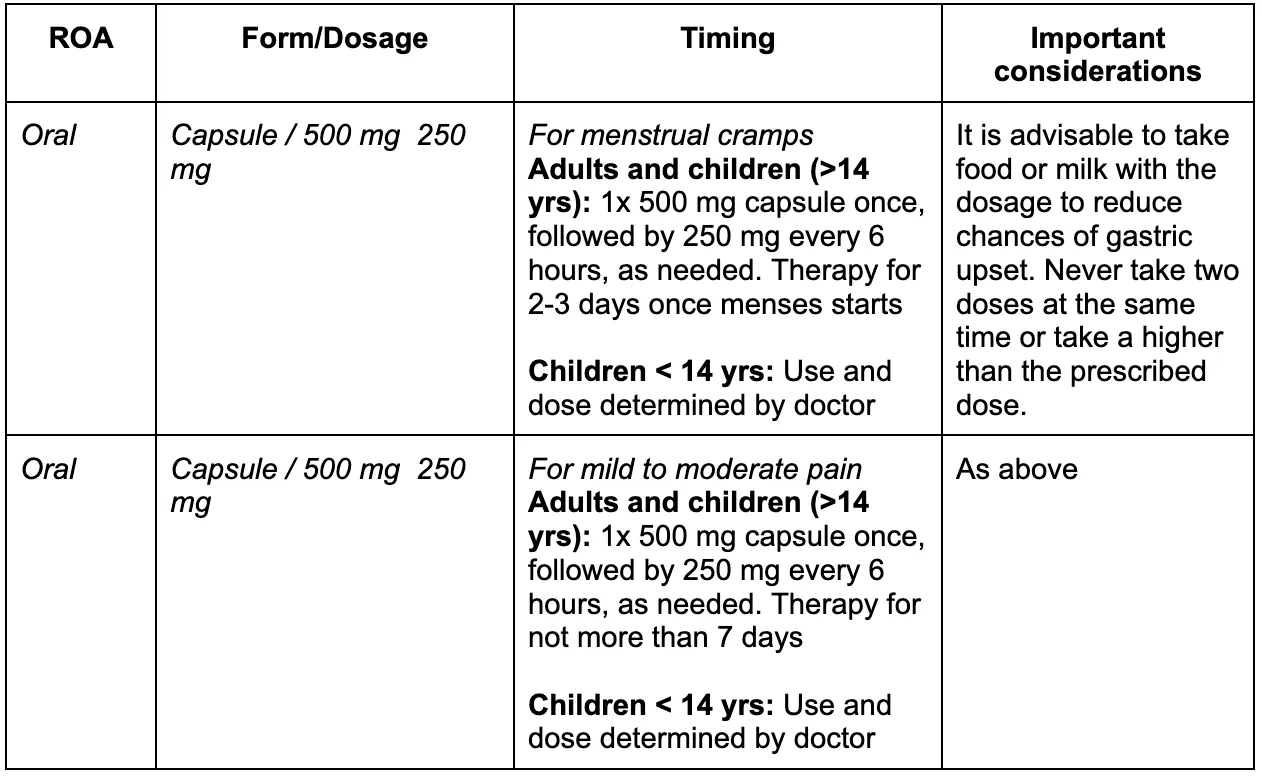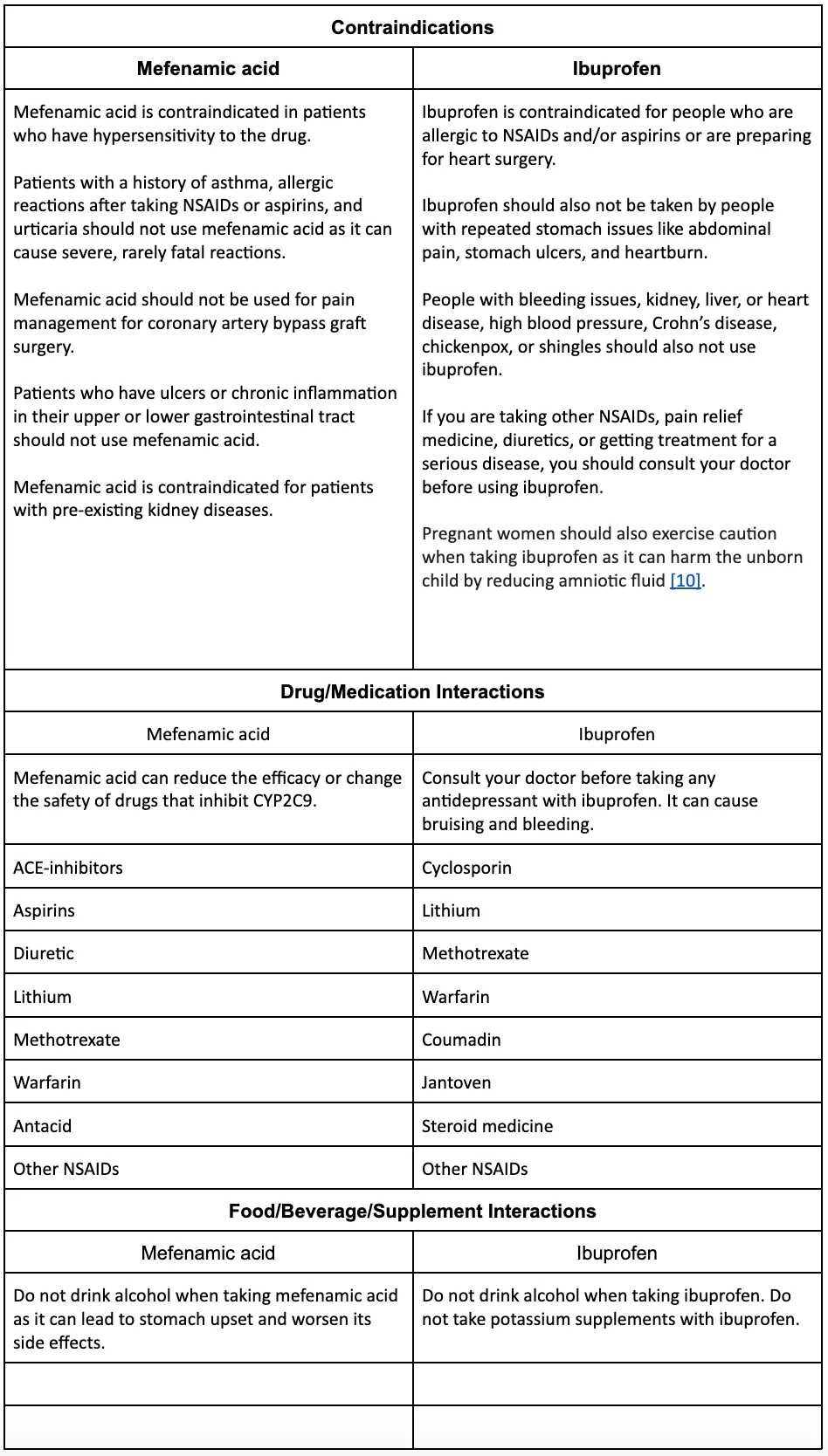Mefenamic Acid vs Ibuprofen
Fever discomfort in the form of muscle pain and severe period cramps are among the most common ailments experienced by patients of all ages. Mefenamic acid and ibuprofen are two drugs that can help alleviate discomfort and provide pain relief for individuals. These are non-steroidal anti-inflammatory drugs (NSAID) that work by blocking the cyclooxygenase enzymes that are used to make prostaglandins that cause inflammation, fever, and pain.
About Mefenamic Acid and Ibuprofen
What is Mefenamic Acid?
Mefenamic acid, sold as Ponstel, is a type of NSAID that is used for short-term relief from mild to moderate pain in those 14 years of age and above [1]. The drug belongs to the fenamate group of NSAIDs and is sold as 250 mg capsules that are taken orally. It works by blocking certain chemical enzymes in the body that result in inflammation and is effective in reducing pain, swelling, and fever. Mefenamic acid is a prescription-only drug and is available only in capsule form.
What conditions is mefenamic acid approved to treat?
Mefenamic acid is used to treat various conditions as determined by a physician, including:
- Dysmenorrhea or period cramps
- Muscle aches
- Headache
- Dental pain
- Arthritis pain
- Pain after surgical procedures
- Mild to moderate pain in patients at least 14 years of age for up to seven days.
How does mefenamic acid work for pain and dysmenorrhea?
Mefenamic acid has antipyretic, anti-inflammatory, and analgesic properties, which stop the action of cyclooxygenase enzymes. These enzymes produce prostaglandin within the body, which causes inflammation, fever, and pain. Some prostaglandins are produced at the injury site and result in inflammation and pain. Mefenamic acid blocks the effect of the cyclooxygenase enzymes, producing fewer prostaglandins, which means inflammation and pain is alleviated [2].
What is Ibuprofen?
Ibuprofen is sold under many brand names, including Advil and Mortin. It is a non-steroidal anti-inflammatory drug and works the same way as mefenamic acid – by reducing the action of the enzymes that cause pain and inflammation in the body [3].
The drug is used to provide temporary relief for minor and moderate pain and aches in the body.
Ibuprofen is prescribed or can be bought over-the-counter. It is available in capsule, tablet, and liquid forms.
What conditions is ibuprofen approved to treat?
Since ibuprofen is an NSAID, it can be used on a short-term basis to relieve minor to moderate aches and pains. Some conditions that ibuprofen is used for include [4]:
- Migraines and headaches
- Fever and inflammation
- Backache and muscular body ache
- Dental pain
- Pain caused by rheumatoid arthritis and osteoarthritis
- Painful menstrual cramps
How does ibuprofen work for body aches and period cramps?
Like mefenamic acid, ibuprofen is an NSAID, which means it has anti-inflammatory and antipyretic properties. The drug works by stopping the production of hormone-like prostaglandins, which results in inflammation, pain, and fever.
Effectiveness
How effective are mefenamic acid and ibuprofen for treating period cramps and pain?
Both mefenamic acid and ibuprofen work by blocking the action of cyclooxygenase enzymes that result in pain, inflammation, and fever. As such, both these drugs offer at least moderate pain relief for primary dysmenorrhea and minor to moderate body aches [5]. Mefenamic acid and ibuprofen reduce the need for rescue analgesic and allow patients to live without restrictions.
Dosage information
How is mefenamic acid administered for treating pain and period cramps?
Mefenamic acid dosage information

How is ibuprofen administered for pain and period cramps?
Ibuprofen dosage information
Side Effects
What are the most common side effects of mefenamic acid?
Some of the most common side effects of mefenamic acid include [6]:
- Diarrhea, constipation, gas, and heartburn
- Nausea and vomiting
- Dizziness
Are there any potentially serious side effects of mefenamic acid?
Mefenamic acid is considered quite a safe drug, and most people do not report serious side effects. However, in rare cases, some serious side effects can occur, such as:
- A skin rash
- Shortness of breath
- Swelling of the body
- Flu-like symptoms, including severe weakness, swollen glands, fever, and muscular pain
- Bloody stools and/or cloudy urine
- Coughing up blood or vomit that looks like coffee grounds
- Liver problems, including stomach pain on the upper right side, loss of appetite, and jaundice (yellowing of the eyes and skin)
- Kidney problems, including shortness of breath, swollen feet and ankles, and little or no urination
- Anemia due to low red blood cell count characterized by a pale and wan complexion, fatigue, light-headedness, shortness of breath, and cold hands and feet
- Anaphylaxis
If you experience any of the above side effects, stop using mefenamic acid and consult your doctor immediately [7].
What are the most common side effects of ibuprofen?
Some of the most common side effects of ibuprofen include:
- Stomach upset or gas
- Nausea and vomiting
- Headache or dizziness
Are there any potentially serious side effects of ibuprofen?
As far as drugs go, ibuprofen is quite safe. However, in some cases, it can cause serious side effects. These can include:
- Blurred vision or changes in vision
- Shortness of breath
- Rapid weight gain or swelling
- A skin rash, even a mild one
- Bloody stools and/or cloudy urine
- Coughing up blood or vomit that looks like coffee grounds
- Liver problems, including stomach pain on the upper right side, loss of appetite, and jaundice (yellowing of the eyes and skin)
- Kidney problems, including shortness of breath, swollen feet and ankles, and little or no urination
- Anemia due to low red blood cell count characterized by a pale and wan complexion, fatigue, light-headedness, shortness of breath, and cold hands and feet.
If you experience any of the above side effects, stop using ibuprofen and consult your doctor immediately.
Contraindications and interactions
Warnings and general precautions for mefenamic acid and ibuprofen
It is important that you visit your doctor for a regular check up when taking mefenamic acid and ibuprofen [8]. If you experience unwanted side effects, a blood or urine test may be needed.
The use of mefenamic acid may raise your risk of stroke or heart attack. People who are already at high risk of heart disease or have been using mefenamic acid for a long time may be more susceptible to these issues.
In some cases, the prolonged use of mefenamic acid and ibuprofen may cause stomach or intestinal bleeding. Again, you are more susceptible if you have a history of stomach ulcers, are a habitual smoker or drinker, are over 60 years of age, use other medication like blood thinners or steroids, or lead a poor lifestyle.
Mefenamic acid and ibuprofen may cause temporary infertility in women or cause harm to the infant in late-stage pregnancy.
Ibuprofen can make you drowsy and dizzy, so avoid driving or using potentially dangerous machinery until you are fully able to. It may also make you more sensitive to the sun so it is advisable to avoid exposure to UV rays.
Before using either of these drugs, you should inform your doctor of your medical history and any other medication or herbal supplements you may be taking [9]. Never self-prescribe.
Contraindications and important interactions for mefenamic acid and ibuprofen

Cost Comparison
How much do mefenamic acid and ibuprofen cost?
A 250mg packet of 30 mefenamic acid costs $168.21. The cost of ibuprofen is $10.74 for a 6 tablet-package of 800mg dosage. Generic mefenamic acid and ibuprofen are also available at a lesser cost.
Popularity of mefenamic acid and ibuprofen
There are no significant differences in the efficacy of mefenamic acid and ibuprofen. Both drugs can effectively alleviate mild to moderate pain, as well as painful menstrual cramps. Both these drugs compare favorably with each other, and your doctor may prescribe them as alternate drugs. However, ibuprofen is considerably more affordable than mefenamic acid.
Conclusion
Takeaway
Mefenamic acid and ibuprofen are both NSAIDs that are used to treat mild to moderate body pain and painful menstrual cramps. These drugs are considered generally safe, though improper use or allergy to NSAIDs can lead to mild to serious reactions.
It is a good idea to understand potential side effects and contraindication before using these drugs. Inform your doctor of your medical history and any medication you take so that they can make an informed and safe decision when prescribing the drugs.